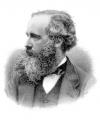All the snows have fled, and grass springs up on the meadows,
And there are leaves on the trees;
Earth has changed her looks, and turbulent rivers decreasing,
Slowly meander along;
Now, with the naked nymphs and her own twin sisters, Aglaïa
Gracefully dances in time.
But the Year, and the Hours which hurry along our existence,
Solemnly warn us to die.
Zephyr removes the frost, and Summer, soon destined to perish,
Treads in the footsteps of Spring,
After the joyous reign of Autumn, abounding in apples,
Shivering Winter returns.
Heavenly waste is repaired by the moon in her quick revo-lutions
But when we go to the grave,
Beside the pious Æneas, and rich old Tullus, and Ancus,
We are but dust and a shade.
Who knows if the gods above have determined whether to-morrow
We shall be living or dead.
Nothing will come to the greedy hands of your spendthrift successor
Which you have given away.
When you are gone to the grave, and Minos, sitting in judg-ment,
Utters your terrible doom,
Neither your rank nor your talents will bring you to life, O Torquatus,
Nor will affection avail;
Even the chaste Hippolytus was not released by Diana
From the infernal abyss,
Nor could Theseus break from his friend the rewards of presumption
Which the stern monarch imposed.
Seventh Ode Of The Fourth Book Of Horace
written byJames Clerk Maxwell
© James Clerk Maxwell






